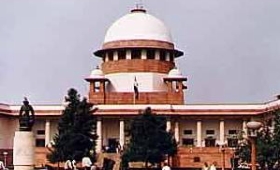|
|
|

|
CJI's inclusion will ensure independence in appointment of Chief Election Commissioner: SC
|
|

|
|
| Top Stories |
 |
|
|
|
IANS | 23 Nov, 2022
The
Supreme Court on Wednesday said to ensure independence of the poll
panel, the Chief Justice of India (CJI) could be included in the
consultative process for the appointment of Chief Election Commissioner
(CEC).
A five-judge, headed by Justice K.M. Joseph and
comprising Justices Ajay Rastogi, Aniruddha Bose, Hrishikesh Roy, and
C.T. Ravikumar, is hearing a clutch of petitions seeking a
collegium-like system for the appointment of Election Commissioners
(ECs) and the CEC.
The top court said any ruling party likes to
perpetuate itself in power and can appoint a 'Yes Man' to the post under
the current system. "Now, what we want to do is concentrate on the
consultative process for the appointment of CEC and the inclusion of the
Chief Justice of India in the process would ensure the independence of
the commission," it said.
In the post-lunch hearing, Solicitor
General Tushar Mehta, representing the Centre, submitted that there is a
system of separation of powers and there is an impression which has
been made out that someone's presence has to be in the appointing
authority who is not a part of the executive. "That will mean rewriting
the Constitution," he argued.
He added that will mean conferring
someone else with power because the executive cannot dispense a function
which has been conferred upon it and it would be against the very
concept of democracy.
At this, Justice Joseph said that the CJI
is involved in the appointment of CBI Director and queried Mehta as to
"where is the threat to democracy" and judgments given by courts, which
has been accepted by the executive.
In the CBI Director context,
Mehta said the CBI Director before Vineet Narain (judgment) was only an
officer and there was a vacuum as to how the person were to be selected,
and his selection was not conferred upon the highest constitutional
functionary. He said that is why the court interfered and as a
constitutional position, they cannot compare Vineet Narain and the
present case.
Mehta said as a constitutional proposition, the
executive independence and the judiciary's independence are equally
sacrosanct, and in a presupposition that only with the presence of the
judiciary, independence and fairness will be achieved, that is "an
incorrect reading of the Constitution".
Earlier during the day,
the Centre had argued that the Election Commission (Conditions of
Service of Election Commissioners and Transaction of Business) Act,
1991, ensured the Election Commission remains independent in terms of
salary and tenure to its members and there is no "trigger point" which
warrants interference from the court.
However, the apex court said the appointments have to be scanned at every level.
Attorney
General R. Venkataramani, representing the Centre, pointed out that the
1991 Act was a watershed moment that ensured independence in salary and
tenure to the ECs.
He said the Parliament passed the law after
the report from the Dinesh Goswami committee, therefore it cannot be
said that there was no application of mind.
However, the bench
said if a 'Yes Man' were to be appointed who has the same philosophy as
the ruling party and he is also like-minded, the law provides him all
the immunity in tenure and salary, as it queried the AG on the
independence in the institution.
The AG vehemently argued that
there is no trigger point which warrants interference from the court and
it is not a case where some arbitrariness exists, which warrants court
to interfere in the appointment process.
The top court will continue to hear the matter on Thursday.
|
|
|
| |
|
|
|
|
|
|
|
|
|
|
|
|
|
|
| |
| Customs Exchange Rates |
| Currency |
Import |
Export |
US Dollar
|
₹91.35
|
89.65 |
UK Pound
|
₹125.3
|
₹121.3 |
Euro
|
₹108.5
|
₹104.85 |
| Japanese
Yen |
₹58.65 |
₹56.8 |
| As on 19 Feb, 2026 |
|
|
| Daily Poll |
 |
 |
| What is your primary "Make or Break" expectation from the Finance Minister this year? |
|
|
|
|
|
| Commented Stories |
 |
|
|
|
|
|
| |
|